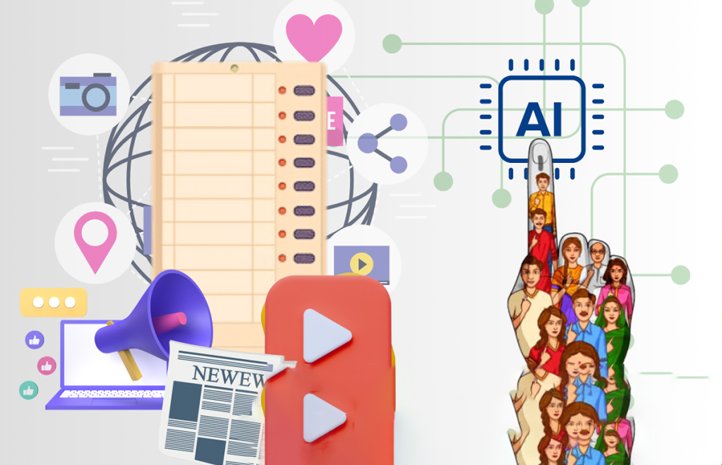As we stand on the cusp of the largest election year in the history where almost 4.2 billion people in 72 countries from across the world are going to cast their voters, the role of artificial intelligence (AI) in impacting electoral processes looms larger than ever. Leaders and campaign managers worldwide adopt new strategies to enhance effectiveness of the campaign and connect with voters. From highlighting popular issues to micro-targeting voters, AI has revolutionised every domain of how elections are fought. While misinformation has long been a challenge in electoral processes, whether it is to deceive voters or harm political opponents. The current prevalence of synthetic media, where it is difficult to discern between real and fake, during campaigns amplifies its significance.
The World Economic Forum’s ‘Global Risks Report, 2024’ found out misinformation and disinformation as the paramount short-term risk. Major tech companies are collaborating with electoral bodies to tackle this menace in their platforms, for instance, recently Google announced that its AI chatbot will be restricted from answering any election-related queries. Google also joined hands with Election Commission of India (ECI) to provide poll-related information through its platforms. Meanwhile, Ministry of Electronics and Information Technology (MeitY) issued advisory asking big techs to seek approval before deploying any generative AI tool or models, however, later withdrawn mandating only labelling of AI-generated content, this signals the gravity of the situation. The series of steps just before the elections are to be announced emphasis the seriousness of issues and potential of the technology to impact election and the need for proactive responses.
Implications of AI Advancements
The widespread availability of affordable and advanced generative AI tools, along with proliferation of digital devices, further exacerbates the challenge. Coupled with low level of digital and technology literacy and inadequate means to verify AI-generated content adds up to the complexity of combating this issue.
It can have far reaching implications for the elections from manipulating voters to rendering existing regulatory architecture inefficient in dealing with such threats as evident from Slovakia incident. In the September 2023 Slovakian elections, an AI-manipulated audio recording circulated during the 48-hour media blackout period, allegedly showing the leader of the Progressive Slovakia party discussing election rigging. Although later deemed fake, its release during the blackout limited media's ability to debunk it. The party, originally slightly behind in polls, ended up finishing second, indicating potential influence from the viral clip. This indicates the possible harms of AI at a speed, which is difficult to tame and allowing little time to react and respond.
Awareness and Understanding Among Stakeholders
According to the study titled ‘What Indian Parliamentarians Think of AI?’, conducted by Institute for Governance, Policies and Politics’, New Delhi and released on 7th March 2024, highlights the significant gap between the pace of
technological advancement and the lack of understanding and awareness among
Indian parliamentarians. Their limited comprehension to understand and
perceive the threat posed by AI further impedes their ability to effectively
address these challenges even when directed against them. Similarly, voters face
difficulty in discerning the synthetic media from the real and with limited tools
to verify AI-generated content, as underlined by PM Narendra Modi. According
to the same report parliamentarians perceive that AI is going to have negative
impact on the society, reflecting a broader tendency towards fear mongering,
canvas often portrayed by media and technical experts themselves. Fear
mongering approach rather than a nuanced understanding of the technology and
its mitigation strategies will be counter-productive in near future. In USA, the
Federal Communications Commission responded to incidents like the use of AI-
generated voice robocalls to voters, by making it illegal, following an episode
where AI voice clone impersonating President Joe Biden voice to convince
Hampshire voters to not to vote. Indian government responded to deepfake
threat by mandating approval of generative AI models or tool (later withdrawn,
mandating only labelling of AI-generated content), primarily driven by
apprehension and adopted a more reactionary approach to the situation rather
than responding with a well-calibrated robust policy intervention.
The ECI has also acknowledged the threat posed by AI to the integrity of the
electoral process. Consequently, it collaborated with the big techs in countering
AI-generated content meant to deceive voters. For instance, ECI met with
OpenAI executive to discuss steps to prevent the misuse of AI in forthcoming
Lok Sabha elections.
Towards a Systemic Approach
Amidst this election season, it’s a critical juncture to assess the limits of AI technology and its impact on electoral process, alongside evaluating the effectiveness of existing regulatory architecture and voters’ awareness and readiness to combat emerging technological challenges. There is pressing need to adopt a systemic approach that enables systems to adapt to technological transformation which can effectively counter the negative impacts. This entails investing in counter technologies to identify synthetic media, bolstering existing regulation to withstand the advancement in AI. Subsequently, prioritising initiative to enhance voters’ awareness. Equipping political candidates with necessary understanding of AI and potential threats is crucial. Along with this they must be equipped with the mechanism which can help them to deal with threats of AI directed towards them. Also, at the same time leveraging AI in constructive manner to foster stronger connections with their constituencies effectively. Adopting a holistic systems approach will serve as a guiding framework to navigate this technological wave.


